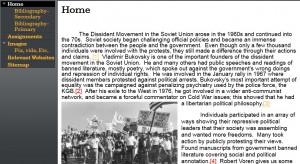
Alyssa DeBlasio is Assistant Professor of Russian at Dickinson College. Before coming to Dickinson, she taught in the Philosophy Department at the Higher School of Economics (Moscow). At Dickinson she teaches courses on Russian culture, literature, and the intersections between philosophy and literature. She also teaches Russian language of all levels, and has been experimenting with the use of podcasts, smart phones, blogging, and social media in the language classroom. She is currently completing a book on philosophy in Russia since 1991 called The End of Russian Philosophy?.
—————–
In the fall 2011 semester I taught a new course called “Russia and the Environment” at Dickinson College. The course was more or less a survey of Russian and Soviet reflections on the natural world in the 18th and 19th centuries. Over 14 weeks we delved into works by Pushkin, Turgenev, Saltykov-Shchedrin, Tolstoy, and Rasputin; secondary sources like Laura Henry’s Red to Green: Environmental Activism in Russia; and a range of films, from Grigory Alexandrov’s Spring to Alexei Popogrebsky How I Ended the Summer.
For the concluding assignment in the course, students were required to choose a topic they wanted to learn more about, research it thoroughly, and contribute an informational blog entry to our course site (http://blogs.dickinson.edu/russenviro/). The goal of the blog was to create an on-line hub for information on Russia and the environment, on topics ranging from forestry in the Soviet Union to holistic medicine.
I have used blogs frequently and successfully (I hope!) in Russian courses for years, but this was my first time incorporating blogging into an English-language course. It was also my first time using the class-sourcing model Karl and Gleb have already posted about. Here is the truth: while I liked this model and I will probably do it again, I encountered all sorts of unanticipated difficulties along the way. Here I’ll share three such difficulties:
How Do I Write It?
At Dickinson, like probably at most colleges and universities, we (faculty) go to painstaking lengths to help our students write better. Most of these efforts are focused on the traditional research paper: writing a thesis statement, offering an original argument, incorporating sources critically, and mastering disciplinary writing. When I assigned a blog entry as a final project, thus, I had no idea the extent to which this type of “encyclopedic” writing would be foreign to my students, who were being pushed from every side to write everything as a research paper. Had I thought about this, I would have given them examples of similar articles as guides. This might have cut down on the number of questions I ended up answering about incorporating sources, authorial voice, citations, etc. Blogging is a genre very different from the research papers they are used to writing, and I made a mistake when I assumed that they knew this already.
When It’s Still No Good
What happens when you mark up numerous drafts, the student revises time and time again, and the entry is still just not good? I designed my assignment such that students had to turn in two drafts of their project before posting their final version to the blog. But there are always those students who wait until the last minute to do final research, don’t proofread their work, or simply don’t succeed at the assignment for one reason or another. As I was reading the final versions during finals week, I wondered: What would I do if there was something up here that was just not quality work? Would I remove it so that it didn’t make the broader project/other students look bad? Would I remove it myself or ask the student to do so? Or would I have to leave it up, since I hadn’t stipulated in advance that only posts meeting a certain set of expectations would be posted to the blog? I hadn’t thought this through, but I realized for the future that I should have an explicit policy about what goes on the web and what stays off. Were I to do it again, I would probably have the final (third) version due a week before the end of the term. This way I could require final corrections (typos, formatting errors, etc.) to be corrected by the students before their final grade was assigned.
Temporary Student, Permanent Blog
Most of the students in my course were seniors. Once they left campus, their interest in our blog fell from “classroom enthusiasm” to “What blog?” Within a month of graduation, their Dickinson emails were defunct and the only valid address on our site was mine. I hadn’t anticipated that I would be receiving emails from media outlets, the occasional academic, and even a South Korean logging firm to ask whether I might put them in touch with so-and-so specialist on Russian deforestation for a piece on logging accidents in the Far East. Even now, nearly 2 years later, Google searches for “Traditional Medicine in Russia” or “Siberia’s Environment” pull up our course blog as the very first hit; other searches, like “Air pollution in Russia,” list up our blog on the first page.
I think this is great, and not only because it makes classroom blogging all the more “authentic.” It shows that Russia and the environment is a sorely underrepresented topic on the web, and that my students truly chose topics that needed further research. But it also adds an additional layer of pressure to the project, particularly when I become the only person accountable for the work after the students graduate. The next time I do this, I’ll have to make one of two choices: either 1) I freeze the blog and make it clear to readers that it was a past project that is no longer functional; or 2) I set the blog up in such a way that future classes take over the work of previous classes. Of course, if the blog is a living Wiki that rolls over from semester to semester, then do future students have the right to edit the work of previous students? And if so, how do I write that into the syllabus? Will this make students less motivated to produce a finished piece of work, since they know that a semester or two from now somebody will have the right to alter everything they have done?
Since I have not used class-sourcing since, I unfortunately cannot offer definitive answers as to how I solved/would solve the problems above. For those of you who have encountered these or other issues, I would be happy to hear about the solutions that worked in your classrooms.







